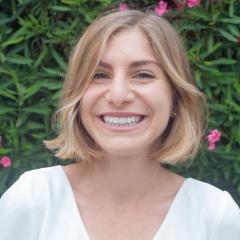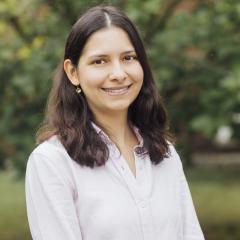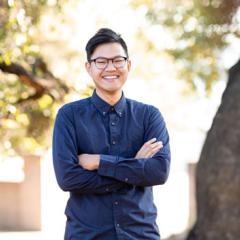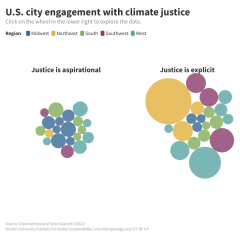Switzer Fellows present at 2024 AAG conference
Several Switzer Fellows are presenting at the 2024 Association of American Geographers (AAG) Annual Meeting taking place in Honolulu Hawai’i from April 16-20, 2024. Fellows’ presentations are on an array of diverse topics: climate adaptation funding outcomes, urban climate justice through building emission reduction, creative writing, reciprocal scholarship, and refugee resilience. See below for excerpts from their presentation abstracts, and be sure to check out their presentations if you’re attending in-person or online!
The foundation supports fellows to attend conferences, trainings and other professional development opportunities through our Professional Development Fund, and we were proud to support one of these fellows to attend AAG 24. We also regularly facilitate meet ups for fellows who are attending conferences and can support a meal or beverage together. Contact us if you have ideas or questions about either of these opportunities!
Genie Bey - Exploring Findings from NOAA Climate Adaptation Partnerships (CAP) Program Bi-Partisan Infrastructure Law Investments
“Through its FY23 call for proposals, supported by the 2021 Bipartisan Infrastructure Law (BIL), CAP funded research focused on supporting national adaptive capacity through three competitions: 1) Improving engagement methods for coastal resilience planning; 2) Assessing tradeoffs and co-benefits for complex decision-making in communities facing coastal inundation and/or inland flooding; and 3) Identifying complex interactions between social infrastructure and wildfire risks to improve community adaptive capacity... Though the research is ongoing, outcomes from this work will support and inform the identification of equitable and inclusive infrastructure investments that mitigate flooding and wildfire risks. This session will explore the preliminary findings gained from a subgroup of projects funded through the FY23 CAP Notice of Funding Opportunity.”
Claudia Diezmartínez - Implementing Just Urban Transitions: Examining the Politics of Climate Justice though the Implementation of Boston’s Building Emissions Reduction and Disclosure Ordinance
“Efforts to decarbonize buildings are at the heart of urban climate action and energy efficiency is the mitigation sector where most cities have articulated justice concerns. One of the latest policy developments in building decarbonization are Building Performance Standards (BPS). BPS require existing buildings to meet a performance target over time (e.g., emissions intensity, energy use intensity)... BPS are increasingly being adopted in U.S. cities of all sizes and some programs, such as Boston’s Building Emissions Reduction and Disclosure Ordinance (BERDO)... I use BERDO as a case study to examine how cities are operationalizing climate justice through climate action and how justice concerns are mobilized and contested during policy implementation.”
Diana Fu - “Remembering Rain”: Creative Writing as a Tool for Decolonizing Geography
“This presentation will look at creative writing as a way of perceiving and showing the intrinsic agency of the (un)built environment, especially as it relates to climate change. I will draw from Daoist and North American Indigenous literature, as well as excerpts of poetry and essays from my own chapbook “In All Spaces Liminal” to demonstrate how creative writing can serve as an alternative method of observing and understanding the world around us. I argue that creative writing, and other forms of creative expression, can reposition the un(built) environment as an agent that exerts forces on humanity, rather than vice versa. This presentation contributes to this session on the intersections of creative writing and geography by showing that practice of creative writing can offer a valuable method for interrogating the intellectualization of the earth through the traditional academic field of geography.”
Rebecca Lave - AAG Presidential Plenary: Reciprocal Scholarship
“This special session focuses on Reciprocal Scholarship and the intellectual and political potential of community-engaged research in geography. Three panelists, all of whom are early-career physical geographers whose research attends both to physical systems and structural injustice, will discuss how they engage deeply with the communities in which they work: on water access in Hawai‘i, climate justice in Rio de Janeiro, and soil contamination in community gardens in the Seattle area.” Rebecca Lave is 2023-24 AAG President and moderator of the panel.
Peter Nguyen - Re-grounding Resilience through Refugee Resilience: Navigating Climate Justice within the Vietnamese Community in New Orleans
“Vietnamese American refugees in New Orleans have long endured strenuous hardships through natural and man-made disasters including Hurricane Katrina, BP oil spill, illegal toxic landfill dumping, and many other environmental injustices. They have been praised for their resilience in rebuilding their lives as immigrants and refugees in the aftermath of these disasters but also face continuing challenges. This raises two questions: how does the Vietnamese community define and negotiate resilience? What are the implications of ascribing resilience to refugee and immigrant communities such as the Vietnamese community in New Orleans?”






